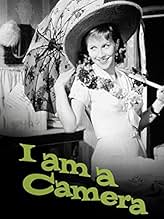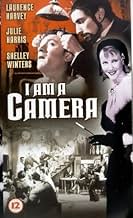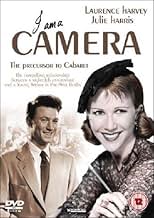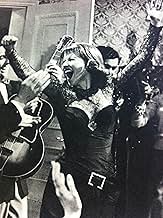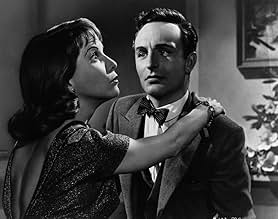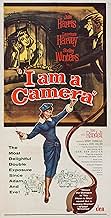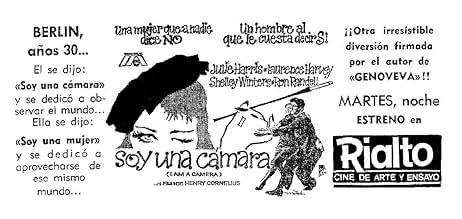अपनी भाषा में प्लॉट जोड़ेंIn Weimar-era Berlin, an aspiring writer strikes up a friendship with a vivacious, penniless singer.In Weimar-era Berlin, an aspiring writer strikes up a friendship with a vivacious, penniless singer.In Weimar-era Berlin, an aspiring writer strikes up a friendship with a vivacious, penniless singer.
- निर्देशक
- लेखक
- स्टार
- 1 BAFTA अवार्ड के लिए नामांकित
- कुल 1 नामांकन
William Adams
- Old Doctor
- (बिना क्रेडिट के)
Ian Ainsley
- Minor Role
- (बिना क्रेडिट के)
Charles Andre
- Waiter
- (बिना क्रेडिट के)
Julia Arnall
- Model
- (बिना क्रेडिट के)
Jack Arrow
- Troika Doorman
- (बिना क्रेडिट के)
फ़ीचर्ड समीक्षाएं
Sally Bowles, the glittering, swaggering, sexually adventurous nightclub chanteuse at the centre of Cabaret is one of the most memorable figures in 70s cinema. Liza Minnelli, who played her in Bob Fosse's critically acclaimed 1972 musical, won an Oscar in the part that seemed tailor-made for her — from the black bowler hat to those kinky boots.
It may be hard to believe now, but in the mid-50s, Julie Harris was Sally Bowles. She played her on stage in John Van Druten's play I Am a Camera — winning a Tony award — and reprised the role in Henry Cornelius's 1955 film. Both works were based on Christopher Isherwood's The Berlin Stories, but their portrayals of Berlin in the early 30s could scarcely be more different. To appreciate Harris's take on Sally you really have to banish memories of the Kit Kat Club, Joel Grey's louche MC and those fabulous songs.
"The more worthless the book the more they need noise and alcohol to launch it." Middle-aged writer Christopher Isherwood (Laurence Harvey) begins this semi-autobiographical tale of his youthful adventures in pre-Second World War Germany with the discovery that sex sells. The irrepressible Sally Bowles has turned author, with the provocatively entitled The Lady Goes on Hoping. Some things never change.
After this Bloomsbury-set opening sequence, I Am a Camera flashes back to Berlin on New Year's Eve 1931. Isherwood, narrates the story of his life as a struggling author, living in a boarding house run by the long-suffering Fräulein Schneider. So far, it seems that his one moment of inspiration has been to come up with that title: "I am a camera, with its shutter open, just watching it, quite detached." Isherwood's professional detachment is tested when he accompanies his friend Fritz (Anton Diffring) to a club, where Sally is performing. In what we soon learn is a familiar pattern, she is soon left high a dry by her latest beau. Feeling sorry for this "naive" girl, our hero gallantly offers her a room for the night, though the platonic terms of their relationship are made clear from the outset.
It's not long before the totally out-of-his depth novelist realises that his new friend's modus operandi is to shock people. Asked why she wears green nail polish, Sally cheerfully explains "To attract men!" As their life together descends into penury and bickering, he alternates between fascination at Sally's lack of morals and self-pity at his inability to make progress with his work.
Harvey went on to play the social-climbing Joe Lampton in Room at the Top and the brainwashed assassin Raymond Shaw in The Manchurian Candidate. I find him more convincing as an embittered cynic than as a suave leading man, so he's well-suited to the role of the permanently exasperated Isherwood. When his one clumsy attempt to seduce Sally is repelled, his sardonic response is to ask "A puritan all of a sudden, or just where I'm concerned?" With her throaty laugh, theatrical mannerisms and fine comedic timing, Harris's Sally is an enthralling and infuriating companion. In the film's most enjoyable sequences, she drags the hard-up Isherwood into a bar, where she downs a succession of champagne cocktails. The arrival of filthy rich American Clive (Ron Randell) leads to a wild party — complete with a hydro-therapist played by Patrick McGoohan.
Of course the sexual dynamics would have looked very different if this film hadn't been made in the mid-50s. There's no hint here that the writer might be gay, or even bisexual – as Michael York's Brian is in Cabaret. Instead, the would-be novelist is just celibate, waspish and openly disapproving of Sally's promiscuity. In the film of Isherwood's later novel, A Single Man, George (Colin Firth) and his best friend Charley (Julianne Moore) have once been on intimate terms, but she reluctantly has to accept his homosexuality.
John Collier's screenplay is at its sharpest and most assured in the scenes of domestic cut and thrust between the flat-mates. But attempts to bring the social and political unrest of pre-war Berlin into the mix are less successful. Though Berlin was on the cusp of seismic events you get little sense here of the growing unease on the streets, while the nightclub scenes are more dreary than decadent. There is an awkward romantic subplot involving Fritz and the wealthy Natalia (a miscast Shelley Winters) that tries to address the dilemma facing Jewish citizens. Isherwood makes a belated attempt to reclaim his independence by brawling with some Nazis in the street, and rebukes Fräulein Schneider for an anti-Semitic remark.
Cornelius, who directed only five films, had to work within the censorship restrictions of the time. This movie may have been an X-certificate in its day, but the Sally of 1955 doesn't get to be as wanton — or show as much leg — as the Sally of Cabaret. As a portrait of the artist as a young man, I Am a Camera is funny and charming and the two leads have good chemistry. But if you want to know why money still makes the world go round, the Kit Kat Club is the place to go.
It may be hard to believe now, but in the mid-50s, Julie Harris was Sally Bowles. She played her on stage in John Van Druten's play I Am a Camera — winning a Tony award — and reprised the role in Henry Cornelius's 1955 film. Both works were based on Christopher Isherwood's The Berlin Stories, but their portrayals of Berlin in the early 30s could scarcely be more different. To appreciate Harris's take on Sally you really have to banish memories of the Kit Kat Club, Joel Grey's louche MC and those fabulous songs.
"The more worthless the book the more they need noise and alcohol to launch it." Middle-aged writer Christopher Isherwood (Laurence Harvey) begins this semi-autobiographical tale of his youthful adventures in pre-Second World War Germany with the discovery that sex sells. The irrepressible Sally Bowles has turned author, with the provocatively entitled The Lady Goes on Hoping. Some things never change.
After this Bloomsbury-set opening sequence, I Am a Camera flashes back to Berlin on New Year's Eve 1931. Isherwood, narrates the story of his life as a struggling author, living in a boarding house run by the long-suffering Fräulein Schneider. So far, it seems that his one moment of inspiration has been to come up with that title: "I am a camera, with its shutter open, just watching it, quite detached." Isherwood's professional detachment is tested when he accompanies his friend Fritz (Anton Diffring) to a club, where Sally is performing. In what we soon learn is a familiar pattern, she is soon left high a dry by her latest beau. Feeling sorry for this "naive" girl, our hero gallantly offers her a room for the night, though the platonic terms of their relationship are made clear from the outset.
It's not long before the totally out-of-his depth novelist realises that his new friend's modus operandi is to shock people. Asked why she wears green nail polish, Sally cheerfully explains "To attract men!" As their life together descends into penury and bickering, he alternates between fascination at Sally's lack of morals and self-pity at his inability to make progress with his work.
Harvey went on to play the social-climbing Joe Lampton in Room at the Top and the brainwashed assassin Raymond Shaw in The Manchurian Candidate. I find him more convincing as an embittered cynic than as a suave leading man, so he's well-suited to the role of the permanently exasperated Isherwood. When his one clumsy attempt to seduce Sally is repelled, his sardonic response is to ask "A puritan all of a sudden, or just where I'm concerned?" With her throaty laugh, theatrical mannerisms and fine comedic timing, Harris's Sally is an enthralling and infuriating companion. In the film's most enjoyable sequences, she drags the hard-up Isherwood into a bar, where she downs a succession of champagne cocktails. The arrival of filthy rich American Clive (Ron Randell) leads to a wild party — complete with a hydro-therapist played by Patrick McGoohan.
Of course the sexual dynamics would have looked very different if this film hadn't been made in the mid-50s. There's no hint here that the writer might be gay, or even bisexual – as Michael York's Brian is in Cabaret. Instead, the would-be novelist is just celibate, waspish and openly disapproving of Sally's promiscuity. In the film of Isherwood's later novel, A Single Man, George (Colin Firth) and his best friend Charley (Julianne Moore) have once been on intimate terms, but she reluctantly has to accept his homosexuality.
John Collier's screenplay is at its sharpest and most assured in the scenes of domestic cut and thrust between the flat-mates. But attempts to bring the social and political unrest of pre-war Berlin into the mix are less successful. Though Berlin was on the cusp of seismic events you get little sense here of the growing unease on the streets, while the nightclub scenes are more dreary than decadent. There is an awkward romantic subplot involving Fritz and the wealthy Natalia (a miscast Shelley Winters) that tries to address the dilemma facing Jewish citizens. Isherwood makes a belated attempt to reclaim his independence by brawling with some Nazis in the street, and rebukes Fräulein Schneider for an anti-Semitic remark.
Cornelius, who directed only five films, had to work within the censorship restrictions of the time. This movie may have been an X-certificate in its day, but the Sally of 1955 doesn't get to be as wanton — or show as much leg — as the Sally of Cabaret. As a portrait of the artist as a young man, I Am a Camera is funny and charming and the two leads have good chemistry. But if you want to know why money still makes the world go round, the Kit Kat Club is the place to go.
In this film Julie Harris reprises her Tony award-winning performance as Sally Bowles bumming in 1920s Berlin. I loved Julie and envied Sally and her carefree ways, but I was young then. While the film may not be "important," it does tell us something about life and culture based upon Christopher Isherwood's evocation of fun-loving pre-Hitler Berlin. It's about a world and time long vanished & highly lamented by aging romantics such as I. So temper your critical faculties and just enjoy a stunning performance by Julie Harris who has won more Tony Awards (5) than any other actress.
Hindsight is a wonderful thing. Much reviled when it first appeared, (inspiring the famous review 'Me No Leica'), this precursor of "Cabaret" can now be looked at in comparison and it's not half bad. It's certainly no classic but it has its own wayward charm, (the film version of "Cabaret" follows this plot whereas the stage version changed the plot somewhat). One should, of course, resist the temptation to snicker when Laurence Harvey's Christopher Isherwood, (it keeps the original author's real name; God Knows what Isherwood thought of it), describes himself as 'a confirmed bachelor' and while Harvey is an utterly inadequate 'hero', (he's virtually asexual), and Shelly Winters woefully miscast as Fraulien Landauer, (the part Marisa Berenson played in "Cabaret"), Julie Harris is a perfectly marvellous Sally, (it's a lovely piece of comic acting), and Anton Diffring is first-rate as Fritz, the German-Jew in love with Shelly's character. Of course, if "Cabaret" had never come along you might ask yourself would this ever have seen the light of day again. That it has been revived may not quite be cause for celebration but it's perfectly acceptable all the same.
With two shining stars such as Julie Harris (the Julie Andrews of the 50s), and Lawrence Harvey, this film was almost guaranteed to be a success. The film is not as graphic as the later, superior production, but it is fun to watch, nevertheless. Even Shelley Winters gives a decent performance for a change (oh no, my harshest critic will be offended!). The Harvey character was supposed to be gay, which the latter production made clear, but during this film period, that issue was pretty much taboo in movies. The film has a Capraesque feel to it, and yet it has a few serious moments as well. I am restricted in my use of the word recommended by my critic, but I am going to use it anyway.
This British film version of the stage play I AM A CAMERA is based on Christopher Isherwood's "Berlin Stories." This is the source material for the famous musical CABARET.
Julie Harris, a major stage actress of her day, reprises her 1951 Tony Award winning role as Sally Bowles. She's a far cry from the Liza Minnelli character but the basic "Sally" is all here despite the various film codes that would have blocked this story from being filmed in Hollywood. Harris is perhaps stagy but she's also quite good as the madcap and maddening Sally. Her singing number is obviously dubbed (by Marlene Dietrich no less) although Harris apparently sings for herself in other moments.
Laurence Harvey (with the very ugly hair) plays Isherwood with zero charm and can't even make the character interesting. Shelley Winters does little with the role of Natalia (Marian Winters won a supporting Tony for the play), and Anton Diffring is OK as Fritz. Ron Randell plays the caddish Clive but seems a tad loud. Lee Seidl is funny as the landlady.
Yet despite the overall staginess and cheap look, Harris takes center stage and she is amazing. This film was released the same year as EAST OF EDEN in which Harris gives a glowing performance as Abra. Comparing the two performances gives a good look at the talent Miss Harris possesses. These two characters couldn't be more unalike. Harris' Sally preens and prances about and growls out a very lascivious laugh. She also acts circles around the boring Harvey.
Without the music and with a familiar storyline, many viewers may find little here to recommend this film, but it's a great chance to see the great Julie Harris repeating what was probably a very shocking role in 1951.
Julie Harris, a major stage actress of her day, reprises her 1951 Tony Award winning role as Sally Bowles. She's a far cry from the Liza Minnelli character but the basic "Sally" is all here despite the various film codes that would have blocked this story from being filmed in Hollywood. Harris is perhaps stagy but she's also quite good as the madcap and maddening Sally. Her singing number is obviously dubbed (by Marlene Dietrich no less) although Harris apparently sings for herself in other moments.
Laurence Harvey (with the very ugly hair) plays Isherwood with zero charm and can't even make the character interesting. Shelley Winters does little with the role of Natalia (Marian Winters won a supporting Tony for the play), and Anton Diffring is OK as Fritz. Ron Randell plays the caddish Clive but seems a tad loud. Lee Seidl is funny as the landlady.
Yet despite the overall staginess and cheap look, Harris takes center stage and she is amazing. This film was released the same year as EAST OF EDEN in which Harris gives a glowing performance as Abra. Comparing the two performances gives a good look at the talent Miss Harris possesses. These two characters couldn't be more unalike. Harris' Sally preens and prances about and growls out a very lascivious laugh. She also acts circles around the boring Harvey.
Without the music and with a familiar storyline, many viewers may find little here to recommend this film, but it's a great chance to see the great Julie Harris repeating what was probably a very shocking role in 1951.
क्या आपको पता है
- ट्रिवियाDespite being far less salacious than the 1951 stage play on which it was based, this film adaptation received a "Condemned" rating from the Legion of Decency, a Roman Catholic organization that passed moral judgments on films between 1933 and 1965. This rating was also given to साइको (1960), Some Like It Hot (1959) and Breathless (1960).
- गूफ़Whilst most of the film is a flashback set in the early 1930s, all the costumes and hairstyles worn are straight out of the early 1950s.
- भाव
Christopher Isherwood: [to Sally] Any mess you get into, you try and get out of by using your extremely inadequate sex appeal.
- क्रेज़ी क्रेडिटIn opening credits, Shelley Winters is misspelled "Shelly".
- कनेक्शनFeatured in Omnibus: Christopher Isherwood: A Born Foreigner (1969)
- साउंडट्रैकI Saw Him in a Café in Berlin
(uncredited)
Music by Ralph Maria Siegel
English lyrics by Paul Dehn
Sung by Liselotte Malkowsky
[Sally (Julie Harris) sings the song in her club act]
टॉप पसंद
रेटिंग देने के लिए साइन-इन करें और वैयक्तिकृत सुझावों के लिए वॉचलिस्ट करें
- How long is I Am a Camera?Alexa द्वारा संचालित
विवरण
- चलने की अवधि
- 1 घं 38 मि(98 min)
- रंग
- पक्ष अनुपात
- 1.37 : 1
इस पेज में योगदान दें
किसी बदलाव का सुझाव दें या अनुपलब्ध कॉन्टेंट जोड़ें


